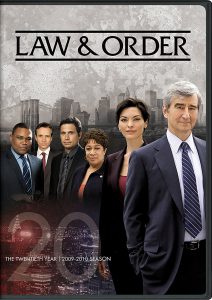Between Hulu and DVRs, it’s easier than ever to watch current TV shows. And since NBC wiped out five hours of programming with its Jay Leno show, and The CW axed its Sunday slots, the schedule is thinner than ever.
So you’d think the shows that do exist would be easy to watch. Yet I feel like “Law & Order” (7 p.m. Central Fridays on NBC) has fallen through the cracks.
Why? First of all, “Law & Order” has no online presence. It’s one of the few network shows — maybe the only one — that doesn’t stream episodes online, either on Hulu or the network site.
Second, it’s on NBC. Because NBC has fewer good shows than other networks, I don’t watch much NBC, so I’m not exposed to “L&O” ads throughout the week. (I’m not the only one, as NBC has been No. 4 in the ratings for a while.)
Third, it’s on Friday nights, which is the most quality-packed night of TV. My DVR goes on the fritz when it has a lot of shows to record in one night — a common situation with this fairly new technology — so it didn’t record the first couple episodes of “L&O” this season.
I switched “L&O” recording duties to the VCR on my second TV, but it’s easy to see how a more casual TV viewer could lose track of “L&O.”
That’s too bad, because it’s still good.
The most recent episode tackled abortion, a topic that we aren’t supposed to talk about. So, of course, “Law & Order” did anyway, and so will I. This episode, titled “Dignity” — I’d normally link you to the episode at this point, but you’ll have to settle for a clip in this case — is a prime example of how topical and intelligent this venerable show still is.
I happen to be in favor of a woman’s right to choose. I want to end that sentence with “naturally,” but I’ve met enough pro-lifers that I have been surprised straight on how evenly matched the two sides are and I won’t assume that one stance is “natural.” (This episode actually says at one point that America is becoming pro-life, and that doesn’t seem accurate to me — especially in this age when we, with good reason, distrust our government — but who knows? I don’t have the stats in front of me.)
At any rate, to me, being pro-choice seems like the most logical stance on this difficult issue. Here’s how I see it: Being pro-choice does not mean you are anti-life (you can support the choice of life). On the other hand, being pro-life means that you are anti-choice; there’s really no getting around that. I’m neither anti-life nor anti-choice, so by definition, I’m pro-choice, as society has defined the term.
What’s beautiful about this “L&O” episode is that it positions sane, sensible characters on both sides of the argument (and also a couple extremists, of course, but those are guest characters, not regulars).

I’ve known some rather arrogant pro-lifers, so it’s refreshing to see that the protestors outside the abortion clinic in this episode push their agenda not through threats or propaganda, but simply by promoting the great things about having a baby. If not for their political stance that choice should be taken away from women, one could argue that this was actually a “choose life” group.
Also, Rubirosa, the assistant DA, is pro-choice, but she questions her stance after hearing haunting testimony about a doctor killing a baby that was accidentally born during a botched abortion. She believes that an overturning of Roe v. Wade could’ve prevented such a scenario. (That gruesome scene is contrasted with touching testimony from a woman who got to be with her sick baby for 21 hours before it died.)
Cutter seems to be pro-life (the indicator is that he uses the term “the unborn” — outside the courtroom, naturally), but he’s all about winning the case and putting the killer of an abortion doctor behind bars.
Bernard is pro-life because he was born prematurely, and he knows that some women would choose to abort a pregnancy that wasn’t going well. For him, being pro-life truly is a matter of life or death.
Lupo seems to be pro-choice because he reacts angrily toward Bernard’s views, although he could just be responding to how Bernard lets his abortion views compromise his professionalism when interviewing a nurse.
As for Van Buren (who has a health issue of her own this season — cancer) and McCoy: They are all about working the case.
At the end of the episode, McCoy puts the feuding Cutter and Rubirosa in the same room and barks, in classic Jack McCoy fashion: “Work it out.” (Technically, their conflict is over law ethics, not abortion, but the “L&O” writers handled this so deftly that I was still thinking about the conflict in Roe v. Wade terms.)
Consider what this episode did: It tackled abortion, a topic we’re not supposed to talk about on network TV; it presented a story that rational folks on both sides can be satisfied with (the defendant was found guilty of the murder after Cutter argued against the chaos of a vigilante society — smoothly taking abortion out of the equation); and finally, it said, “Look, this debate is worth having, but let’s behave like civilized people while we’re debating.”
That’s a great accomplishment, and it’s something “L&O” does regularly (other nicely explored topics this season: immigration laws, and people who use their kids as tickets to reality TV fame). I know it’s been on the air for two decades and it’s not hip and cool anymore, but darn it, “L&O” is a strong, relevant show. It doesn’t deserve to fade away.

